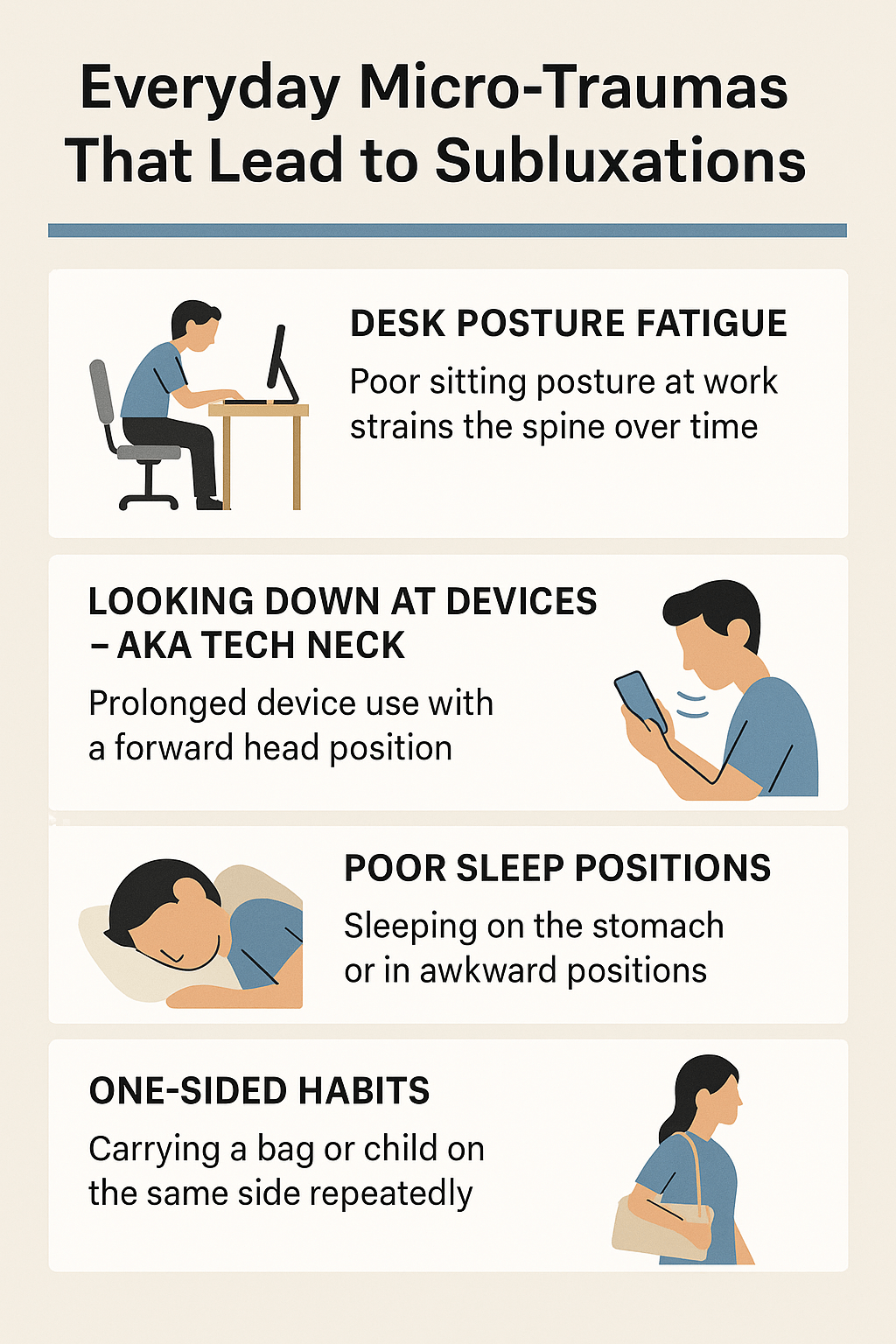We often imagine trauma as something dramatic—a car accident, a nasty fall, or a sporting injury. But what if the real threat to your long-term health wasn’t the big stuff… but the small stuff that slips under your radar every single day?
These are called micro-traumas, and they’re one of the most common causes of subluxations—tiny but powerful joint dysfunctions in your spine that can interfere with your nervous system and slowly chip away at your health, energy, and resilience.
Let’s dive into how these hidden stressors build up, why they matter, and what you can do to protect your spine and nervous system—because when you protect that, you protect your life.
What Is a Micro-Trauma?
A micro-trauma is a subtle, repeated strain or stress on your body—particularly your joints, muscles, and ligaments. Unlike a one-off injury, micro-traumas build up slowly and silently over time. You may not feel them immediately, but their effects compound, leading to dysfunction in the spine and eventually affecting your nervous system.
They’re the “paper cuts” of physical stress: small on their own, but painful and harmful when they add up.
The Most Common Everyday Micro-Traumas
1. Desk Posture Fatigue
Sitting at a desk with a forward head, rounded shoulders, and slouched spine doesn’t hurt on day one—but 8 hours a day, 5 days a week? That’s over 2,000 hours per year of repetitive spinal stress. Over time, this causes the spine to lose its natural curves, especially in the neck and lower back, leading to subluxations and nervous system interference.
2. Looking Down at Devices – AKA Tech Neck
The average Kiwi spends over 3.25 hours a day on their phone. That’s 1,200 hours per year of your neck being pulled forward at unnatural angles. At 60 degrees of flexion, your head puts the equivalent of 27 kg of pressure on your neck. Every text, scroll, and selfie is a micro-trauma if not balanced with proper movement.
3. Poor Sleep Positions
Sleeping on your stomach or with a twisted neck can slowly strain your spine night after night. Many people wake up feeling tight or “off” without realising they’ve spent 6–8 hours applying tension to their spine and nervous system.
4. One-Sided Habits
Carrying a child always on one hip, a heavy handbag on the same shoulder, or leaning to one side while driving—these are subtle but repetitive imbalances. Over time, they create uneven pressure and movement patterns that shift your spine out of its ideal function.
5. Stress-Induced Muscle Tightness
Emotional stress causes physical tension—especially in your upper back, jaw, and shoulders. If left unaddressed, this can pull spinal joints into dysfunctional positions and trigger subluxations, without a single physical accident.
6. Exercise Imbalances and Overtraining
Training the same muscles repeatedly or using poor form during workouts may not lead to immediate injury, but they cause repetitive strain. If a joint isn’t moving well and you load it, that stress will be absorbed by ligaments, discs, or muscles that aren’t designed to carry it.
Why Subluxations Matter
A subluxation is when a spinal joint loses proper motion or alignment, causing interference to your nervous system—the master controller of your entire body.
These aren’t just “cricks” or “stiff spots.” They can reduce the brain’s ability to communicate with organs, muscles, and tissues, leading to:
- Lower energy
- Poor immune response
- Muscle imbalances
- Chronic tightness or pain
- Brain fog or lack of focus
- Disrupted sleep
Because subluxations often don’t cause pain initially, most people don’t realise they have them until symptoms show up months—or even years—later.
The Nervous System Doesn’t Guess, It Responds
When your spine moves poorly, your brain receives distorted messages. That leads to distorted responses. Imagine trying to drive with a foggy windscreen—you won’t see the full picture, and you’ll overcorrect or miss hazards.
Your body works the same way. Clear input = clear output. That’s why chiropractors focus on restoring proper motion and communication through adjustments—so your body can get back to doing what it does best: healing and thriving.
What Can You Do?
The first step is awareness. You now know that micro-traumas are constantly sneaking into your daily life. The second step is action.
✅ Get Checked – Just like you don’t wait for a cavity to become a root canal, don’t wait for a subluxation to become chronic pain. At Limitless Chiropractic, we assess your spinal function and nervous system to uncover the hidden patterns holding you back.
✅ Move More, Sit Less – Incorporate regular movement breaks during the day. Stretch. Walk. Mobilise your spine.
✅ Change Positions Often – If you’re sitting, standing, or sleeping in one position for too long—it’s time to shift. Your spine craves movement.
✅ Handle Stress Proactively – Breathwork, mindfulness, and yes—chiropractic care—can help regulate your nervous system’s response to emotional stress.
Final Thought
Micro-traumas may be small, but their impact is huge. If you’re feeling “not quite right,” stiff, tired, or like you’ve lost your edge—don’t ignore it. Subluxations could be quietly pulling you away from health. The good news? With the right care and consistent action, you can rewind those patterns and start building a body that’s adaptable, energised, and truly limitless.
References:
- Chaibi, A., Tuchin, P.J., & Russell, M.B. (2020). Multimodal chiropractic care for migraine: A pilot randomized controlled trial. Cephalalgia, 40(1), 87–98. https://doi.org/10.1177/0333102420963844
- International Headache Society. Migraine Facts.
- Biondi, D.M. (2005). Physical treatments for headache: a structured review. Headache, 45(6), 738-746.
Experience Limitless Movement Chiropractic Care in Wellington
If you’re in Wellington and looking for expert chiropractic care, we’re here to help. At Limitless Chiropractic, we focus on helping you move better, feel stronger, and live without limits. Book your appointment today and take the first step toward a healthier, more mobile you!
Ready to begin or continue your healing journey? Let’s work together to unlock your body’s natural potential for wellness.
Book Your Limitless Journey Today
or call us at (04) 891 0911
